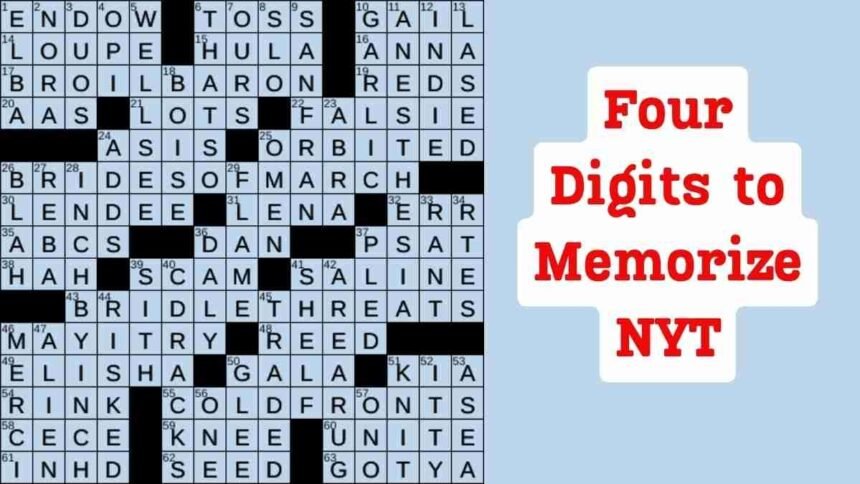Are you tired of struggling to remember important dates, like those featured in the New York Times? Memorizing four digits may seem daunting at first, but fear not! In this blog post, we’ll explore an innovative method that will have you recalling numbers with ease in no time. Get ready to sharpen your memory and impress everyone with your newfound skills! four digits to memorize nyt
The Importance of Memorization and Mental Exercise
Our memory is like a muscle – the more we exercise it, the stronger it becomes. Memorization not only enhances our cognitive abilities but also boosts brain function and overall mental agility. By engaging in memory exercises, we stimulate different parts of our brain, improving neural connections and enhancing learning capabilities.
In today’s fast-paced world filled with information overload, having a sharp memory can be a game-changer. Whether it’s remembering important dates or recalling essential facts, honing your memorization skills can give you a competitive edge in both personal and professional settings.
Moreover, regular mental exercises such as memorization help prevent cognitive decline as we age. Just like physical exercise keeps our bodies healthy, mental workouts keep our brains fit and agile. So why wait? Start flexing those memory muscles today!
The Method: Chunking and Visualization
When it comes to memorization, the method of chunking and visualization can be a game-changer. Chunking involves breaking down large amounts of information into smaller, more manageable chunks. By grouping numbers or words together in meaningful ways, your brain can process and recall them more efficiently.
Visualization, on the other hand, taps into the power of mental imagery. When you associate what you want to remember with vivid pictures or scenes in your mind, it becomes easier to retrieve that information later on. Visual cues can trigger stronger memory connections and make recalling details a breeze.
Combining chunking and visualization techniques can supercharge your memorization skills. Instead of trying to tackle long strings of digits all at once, break them down into smaller segments and create mental images for each chunk. This way, you’re not just remembering random numbers – you’re creating a story that sticks in your mind effortlessly.
Application: Memorizing Dates from the New York Times
Memorizing dates from the New York Times may seem like a daunting task at first glance, but with the right techniques, you can make it a breeze. By applying the method of chunking and visualization, you can break down long strings of numbers into smaller, more manageable chunks. For example, instead of trying to remember “20211010,” you could visualize it as “20-21-10-10.”
When practicing this technique with dates from news articles or historical events, try to create vivid mental images associated with each number sequence. This will help your brain retain the information more effectively. For instance, for the date “17760704” (the U.
S. Declaration of Independence), picture fireworks exploding in 1776 on July 4th.
By incorporating these memory strategies into your daily routine, you’ll not only enhance your memorization skills but also boost your overall cognitive abilities. So next time you come across important dates while reading the New York Times or any other publication, put these techniques to use and watch how effortlessly you recall them later on!
Tips and Tricks for Effective Memorization
So, you want to boost your memory skills and become a memorization pro? Well, you’re in luck! Here are some handy tips and tricks to help you effectively memorize those four digits from the NYT in no time.
First off, create a mnemonic device or a mental image to associate with each set of numbers. This technique can make recalling information a breeze!
Next, practice active recall by testing yourself regularly. Quiz yourself on the dates you’ve been working on to reinforce your memory.
Another great tip is to break down the numbers into smaller chunks. Instead of trying to remember all four digits at once, focus on remembering them in pairs or groups.
Additionally, try incorporating multisensory learning techniques. Write down the numbers, say them out loud, and even visualize them in your mind’s eye for better retention.
Stay consistent with your practice. Regularly challenge yourself with new sets of numbers to keep your brain sharp and improve your memorization skills over time. Trust me; it’s all about dedication and persistence when it comes to mastering these memory tricks!
Practice Makes Perfect: Putting Your Skills to the Test
So, you’ve learned the method of chunking and visualization to memorize those tricky four-digit numbers from the New York Times. Now, it’s time to put your skills to the test!
Start by practicing with a few dates each day. Challenge yourself to recall them without peeking at your notes. As you get more comfortable, increase the number of digits you work with. Make it fun by turning it into a game or setting small goals for yourself.
Don’t get discouraged if you stumble along the way; remember that practice makes perfect. The more you exercise your memory muscles, the stronger they’ll become.
Try mixing up the order of the digits or adding in some random numbers to keep things interesting. This will help sharpen your focus and improve your recall abilities even further.
Keep in mind that consistency is key when it comes to mastering any skill. So, make memorizing a part of your daily routine and watch as your memory prowess grows exponentially!
Long-Term Benefits of Memory Techniques
Mastering memory techniques offer benefits that extend far beyond just memorizing data. By consistently challenging your brain to remember and recall information, you are essentially giving it a regular workout, which helps improve cognitive function over time.
As you continue to practice these techniques, you may notice enhancements in your overall focus and attention span. This heightened mental acuity can positively impact various aspects of your life, from work performance to academic success.
Moreover, memory techniques can boost your problem-solving skills by honing your ability to make connections between seemingly unrelated pieces of information. This enhanced capacity for critical thinking is a valuable asset in both personal and professional settings.
Additionally, as you strengthen your memory through consistent practice, you might find that retaining new knowledge becomes more effortless. This increased efficiency in learning new material can open up opportunities for growth and development in various areas of life.
Conclusion
Mastering the art of memorization not only enhances your cognitive abilities but also boosts your confidence in recalling important information quickly. By utilizing techniques like chunking and visualization, you can easily remember complex data such as four digits from the New York Times effortlessly.
Remember, practice is key to improving your memory skills. So, challenge yourself regularly by memorizing dates or numbers using the methods discussed in this article. Over time, you’ll notice a significant improvement in your ability to retain information efficiently.
Start incorporating these memory techniques into your daily routine and witness the remarkable impact they have on sharpening your mind. With dedication and consistent practice, you’ll soon find yourself impressing others with your newfound ability to memorize four digits from NYT times in no time!










